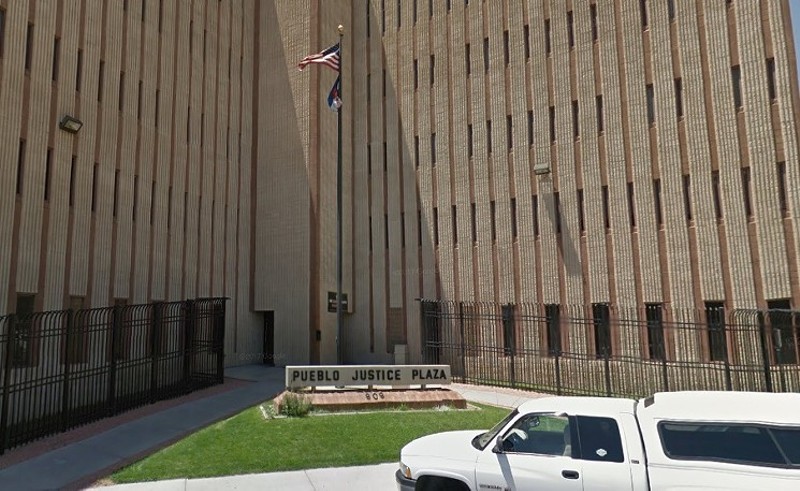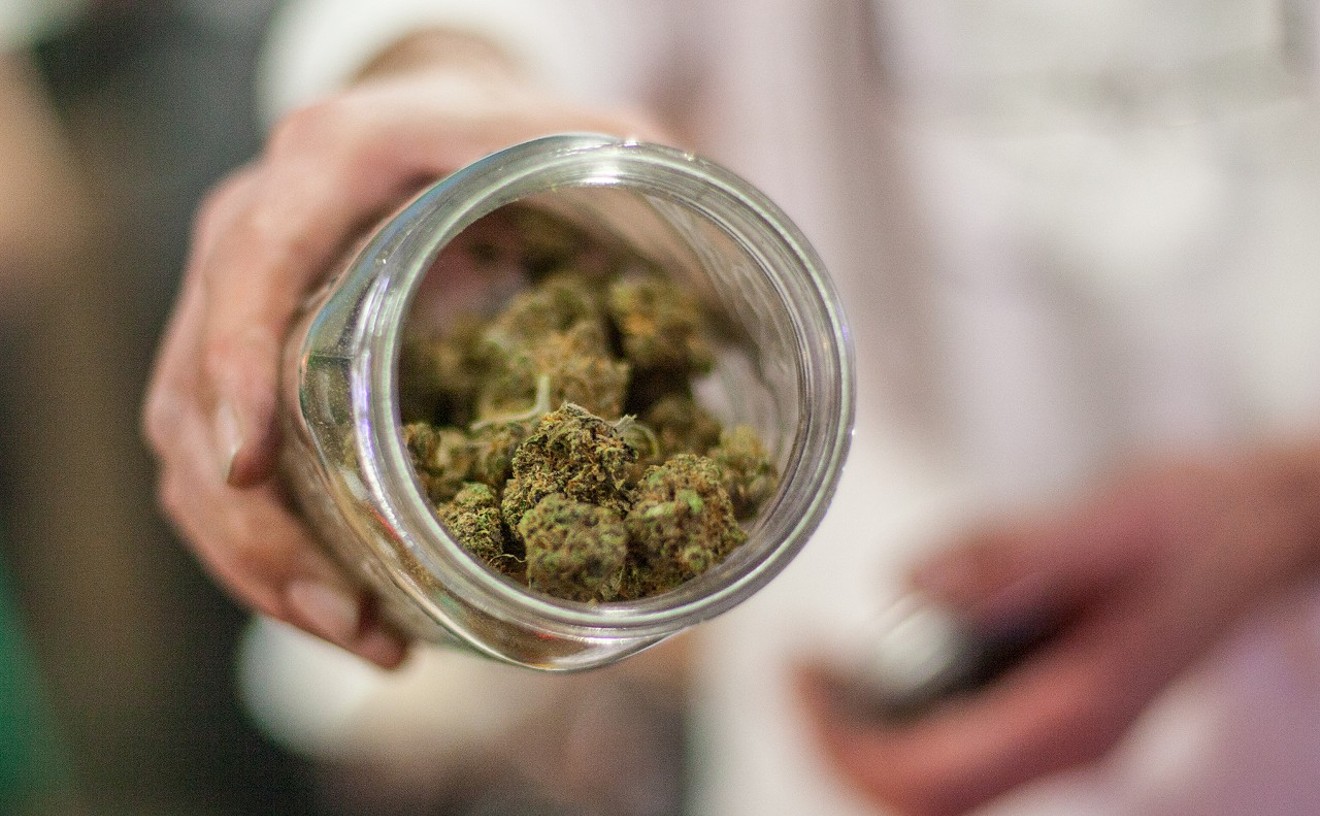For the past six years, Pueblo County voters have turned down proposals to use marijuana tax dollars to fund a new jail. Yet that hasn't stopped the county's commissioners from moving the project, estimated to cost upwards of $90 million, forward.
Pueblo Country voters balked at the idea of using those new funds to build a new county jail and extend a new road named in honor of Joe Martinez, a local Word War II hero. But when voters approved to increase the local sales tax on retail marijuana from 3.5 percent to 6 percent in 2019, the ballot initiative didn't specify where the money would go. As a result, the County Board was able to finally secure the project's funding source without voter approval.
County Commissioner Garrison Ortiz, the primary advocate behind the new jail, says the board's decision was made out of concerns over the current county jail's deteriorating infrastructure and general safety of workers and inmates. However, opponents aren't keen on the idea of using marijuana revenue to build a new jail.
"We do feel like they deserve to be housed in safe conditions where they are segregated properly among inmates that are sorted by different levels of risk. We just think that’s really important,” he says, adding that the jail is the county's biggest source of expenses.
The longer those problems are ignored, the more expensive and difficult it will be for taxpayers to keep up with the jail's failing structure, Ortiz argues.
“The new jail is a tough project that I’ve had to work on, because there are so many other things in our community that I would love to see money invested in," he says. "But, unfortunately, it’s something that needs to be done."
According to the project's proposal, Pueblo County Jail was built in 1980 to house 189 inmates, with a thirty-to-35-year lifespan. The detention center was expanded in 2006 for a dormitory to house 320 more inmates, increasing maximum capacity to 509. Today that population number fluctuates, but on average the facility houses up to 800 people, according to the County Board. The new jail project proposes 650 to 670 total beds.
The idea of using tax dollars from marijuana, still a federally illegal drug, to fund incarceration and fuel the consequences of the War on Drugs has come under scrutiny from marijuana and criminal justice advocates. According to Dr. Colleen Hackett at CSU Pueblo's Department of Sociology, Criminology and Anthropology, such a project would disproportionately impact low-income and marginalized communities rather than address Pueblo's deeply rooted problems.
"We could spend our money to better fund community-based treatment resources for substance abuse and mental health, to help strengthen our crumbling public-school systems, to offer better economic opportunities for our citizens, and to meaningfully address domestic violence in the community. Relying on a new jail with such a high price tag is extremely short-sighted and disappointing," Hackett says.
The price tag Hackett is referring to is the financial package of $115 million dollars budgeted for the new jail and construction of Joe Martinez Boulevard. Payable over a thirty-year loan, the Joe Martinez project will extend Pueblo West to the City of Pueblo and will have either a two- or four-lane road. Pueblo County voters approved using $3 million from a local community development fund towards the Joe Martinez extension, which is estimated to cost $19 million to $26 million; the new jail is estimated to cost between $90 million and $96 million. Outside of the $3 million from the community development fund, the project's loan will be paid off in marijuana revenue. If additional funding is needed, county commissioners have discussed using revenue from local marijuana excise taxes.
Ortiz believes the new jail is a progressive investment for Pueblo County, and that the Joe Martinez Boulevard extension will attract more economic development to the county. The final resolution pledges to use green energy for the new jail through a neighboring solar power project, which would make it one of the first zero-net jails in the nation, he adds.
The majority of inmates in the current Pueblo County Jail are suffering from drug addiction and withdrawal amid Pueblo's growing opioid crisis. According to the Board, the 2006 dormitory extension of the current jail will be converted into a mental health and substance abuse treatment facility — but that has been put on hold in favor of the Joe Martinez project.
"Pueblo County has a lot of programs for helping people with substance abuse, mental health issues, keeping people out of jail. We know we need to do more, and we are doing more," Ortiz says. "I know it's not the most attractive or appealing project, politically, to invest in. But unfortunately, it's something that really needs to be done."
The new jail project is scheduled for completion by late 2024, while the Joe Martinez extension is expected to be finished earlier that year.
[
{
"name": "Air - MediumRectangle - Inline Content - Mobile Display Size",
"component": "12017618",
"insertPoint": "2",
"requiredCountToDisplay": "2",
"watchElement": ".fdn-content-body",
"astAdList": [
{
"adType": "rectangle",
"displayTargets": "mobile"
}
]
},{
"name": "Editor Picks",
"component": "17242653",
"insertPoint": "4",
"requiredCountToDisplay": "1",
"watchElement": ".fdn-content-body",
"astAdList": [
{
"adType": "rectangle",
"displayTargets": "desktop|tablet"
},{
"adType": "rectangle",
"displayTargets": "desktop|tablet|mobile"
}
]
},{
"name": "Inline Links",
"component": "18838239",
"insertPoint": "8th",
"startingPoint": 8,
"requiredCountToDisplay": "7",
"maxInsertions": 25
},{
"name": "Air - MediumRectangle - Combo - Inline Content",
"component": "17261320",
"insertPoint": "8th",
"startingPoint": 8,
"requiredCountToDisplay": "7",
"maxInsertions": 25,
"watchElement": ".fdn-content-body",
"astAdList": [
{
"adType": "rectangle",
"displayTargets": "desktop|tablet"
},{
"adType": "rectangle",
"displayTargets": "desktop|tablet|mobile"
}
]
},{
"name": "Inline Links",
"component": "18838239",
"insertPoint": "8th",
"startingPoint": 12,
"requiredCountToDisplay": "11",
"maxInsertions": 25
},{
"name": "Air - Leaderboard Tower - Combo - Inline Content",
"component": "17261321",
"insertPoint": "8th",
"startingPoint": 12,
"requiredCountToDisplay": "11",
"maxInsertions": 25,
"watchElement": ".fdn-content-body",
"astAdList": [
{
"adType": "leaderboardInlineContent",
"displayTargets": "desktop|tablet"
},{
"adType": "tower",
"displayTargets": "mobile"
}
]
}
]












